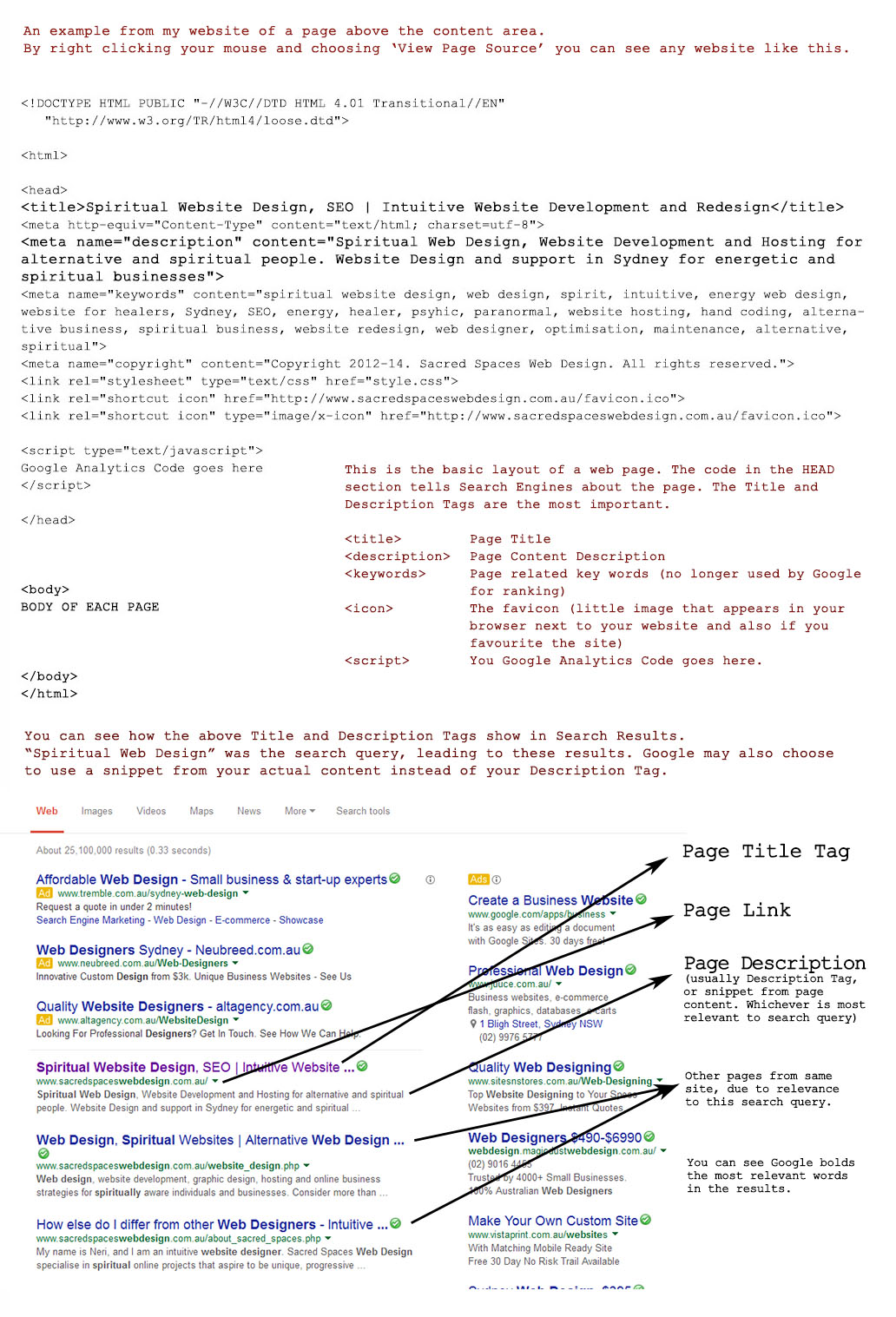SEO and Page Optimisation
Search Engine Optimisation is the work that increases your position in Organic Search Engine Results and also increases your site's user friendliness.
It includes all relevant aspects of good design, well written content and up to date coding.
Often, it is about making small modifications to parts of your website. When viewed individually,
these changes might seem like incremental improvements, but when combined with other optimisations, they could have a noticeable impact on your
site's user experience and performance in organic search results.
 "You should base your optimization decisions
first and foremost on what's best for the visitors of your site. They're the main consumers of your content and are using search engines to find your work.
Focusing too hard on specific tweaks to gain ranking in the organic results of search engines may not deliver the desired results.
Search engine optimisation is about putting your site's best foot forward when it comes
to visibility in search engines, but your ultimate consumers are your users, not search engines." "You should base your optimization decisions
first and foremost on what's best for the visitors of your site. They're the main consumers of your content and are using search engines to find your work.
Focusing too hard on specific tweaks to gain ranking in the organic results of search engines may not deliver the desired results.
Search engine optimisation is about putting your site's best foot forward when it comes
to visibility in search engines, but your ultimate consumers are your users, not search engines."
Good SEO according to Google
- individual title tags for each page that accurately describe that page's content
- individual description tags for each page that accurately describer that page's content
(Description meta tags are important because Google might use them as snippets for your pages.
Note that we say "might" because Google may choose to use a relevant section of your page's visible text
if it does a good job of matching up with a user's query.)
- simple to understand URLs. Use creative and easily understood words in page URL names
- make your site easy to navigation. Logical. Clear links and menus, avoid dropdown menus
- have a 404 error page to catch any broken links or guessed page URLs
- test your website for broken links
- have a sitemap on your server, and verified by Google
- quality content, see more about
content writing here
- clear, description anchor text, make them easy to spot
- alt tag your images, save images in a file called images
- heading tags where appropriate
- make sure Search Engines have permission to crawl your pages
- verify site with Google, and add Google Analytics
- add Blog content if you have an external blog
- make yourself aware of Webmaster Tools - here is
Google's SEO document
- validate your site coding with W3C (World Wide Web Consortium) Markup Validation Service
- choose good hosting to protect your site from viral attacks
- choose good web designer who is aware of and sticks to, Google's rules of good SEO

Not so good SEO practices - "No one can guarantee a #1 ranking on Google."
While SEO experts can provide clients with valuable services,
some unethical SEOs have given the industry a black eye through their overly aggressive marketing efforts and their attempts
to manipulate search engine results in unfair ways.
Practices that violate Google guidelines may result in a negative adjustment of your site's presence in Google, or even the removal
of your site from our index. Here are some things to consider:
One common scam is the creation of "shadow" domains that funnel users to a site by using deceptive redirects.
These shadow domains often will be owned by the SEO who claims to be working on a
client's behalf. However, if the relationship sours, the SEO may point the domain to a different site, or even to a competitor's domain.
If that happens, the client has paid to
develop a competing site owned entirely by the SEO.
Another illicit practice is to place "doorway" pages loaded with keywords on the client's site somewhere.
The SEO promises this will make the page more relevant for more queries.
This is inherently false since individual pages are rarely relevant for a wide range of keywords.
More insidious, however, is that these doorway pages often contain hidden links to the
SEO's other clients as well. Such doorway pages drain away the link popularity of a site and route it to the SEO and its other clients,
which may include sites with unsavory or illegal content.
 Be wary of SEO firms and web consultants or agencies that send you email out of the blue. Amazingly, we (Google) get these spam emails too:
Be wary of SEO firms and web consultants or agencies that send you email out of the blue. Amazingly, we (Google) get these spam emails too:
"Dear google.com, I visited your website and noticed that you are not listed in most of the major search engines and directories..."
Reserve the same skepticism for unsolicited email about search engines as you do for "burn fat at night"
diet pills or requests to help transfer funds from deposed dictators.
Beware of SEO's who claim to guarantee rankings, allege a "special relationship" with Google, or advertise a "priority submit" to Google.
There is no priority submit for Google.
In fact, the only way to submit a site to Google directly is through our Add URL page or by submitting a Sitemap and you can do this yourself at no cost whatsoever.
Be careful if a company is secretive or won't clearly explain what they intend to do.
Ask for explanations if something is unclear. If an SEO creates deceptive or misleading content on your behalf,
such as doorway pages or "throwaway" domains, your site could be removed entirely from Google's index.
Ultimately, you are responsible for the actions of any companies you hire, so it's best to be sure you know exactly how they intend to "help" you.
If an SEO has FTP access to your server, they should be willing to explain all the changes they are making to your site.
You should never have to link to an SEO.
Avoid SEO's who talk about the power of "free-for-all" links, link popularity schemes, or submitting your site to thousands of search engines.
These are typically useless exercises that don't affect your ranking in the results of the major search engines --
at least, not in a way you would likely consider to be positive.
Paying for Ranking
While Google never sells better ranking in our search results, several other search engines combine pay-per-click or pay-for-inclusion
results with their regular web search results.
Some SEOs will promise to rank you highly in search engines, but place you in the advertising section rather than in the search results.
A few SEO's will even change their bid prices in real time to create the illusion that they "control"
other search engines and can place themselves in the slot of their choice.
This scam doesn't work with Google because our advertising is clearly labeled and separated from our search results,
but be sure to ask any SEO you're considering which fees go
toward permanent inclusion and which apply toward temporary advertising.
The most common SEO abuse a website owner is likely to encounter is an SEO who:-
- owns shadow domains
- puts links to their other clients on doorway pages
- offers to sell keywords in the address bar
- doesn't distinguish between actual search results and ads that appear on search results pages
- guarantees ranking, but only on obscure, long keyword phrases you would get anyway
- operates with multiple aliases or falsified WHOIS info
- gets traffic from "fake" search engines, spyware, or scumware
- has had domains removed from Google's index or is not itself listed in Google
- uses software to add SEO rather than organically researching and adding personally
- tries to mystify SEO so you pay for something you can't possibly understand
- does not seem interested in you or your business goals as an individual
I Recommend

I Recommend


MALWARE - STAYING SAFE ONLINE
HTTPS://
DOMAINS and HOSTING
MY WEBSITE
WEBSITE CODE and SEO
DEFINITIONS
|







 "You should base your optimization decisions
first and foremost on what's best for the visitors of your site. They're the main consumers of your content and are using search engines to find your work.
Focusing too hard on specific tweaks to gain ranking in the organic results of search engines may not deliver the desired results.
Search engine optimisation is about putting your site's best foot forward when it comes
to visibility in search engines, but your ultimate consumers are your users, not search engines."
"You should base your optimization decisions
first and foremost on what's best for the visitors of your site. They're the main consumers of your content and are using search engines to find your work.
Focusing too hard on specific tweaks to gain ranking in the organic results of search engines may not deliver the desired results.
Search engine optimisation is about putting your site's best foot forward when it comes
to visibility in search engines, but your ultimate consumers are your users, not search engines."
 Be wary of SEO firms and web consultants or agencies that send you email out of the blue. Amazingly, we (Google) get these spam emails too:
Be wary of SEO firms and web consultants or agencies that send you email out of the blue. Amazingly, we (Google) get these spam emails too: